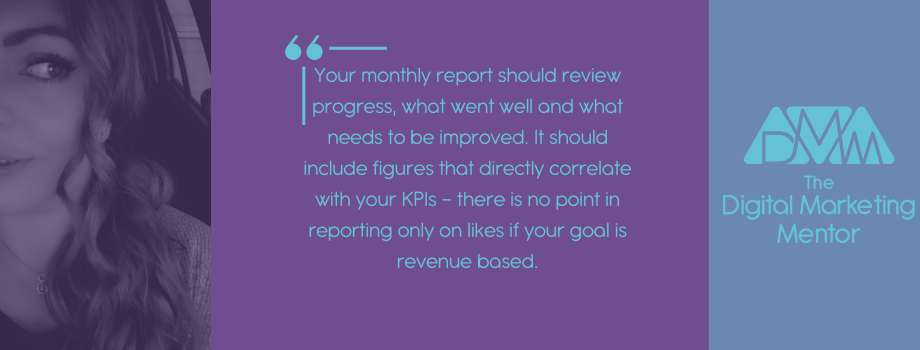I want to start this by saying that these are just 5 of the most common questions and it is not to say that these are the only questions you should ask, or that all of these questions will be relevant to the needs of your organisation.
But, if you are unsure of where to start when looking for the right person or agency to outsource your marketing to, these questions will give you a good baseline.
Lets dive in:
1. What is your experience and expertise in the specific type of marketing that we need?
The digital marketing spectrum is a broad one and, as such, you will need to make sure that the person you are considering outsourcing to, can deliver results in the specific area of your marketing that you need help with the most. This could include areas such as social media marketing, content marketing, email marketing, or search engine optimization.
There is no point in appointing a social media manager to help you with your SEO, for example, because the two require completely different sets of skills.
To complicate things even further, even within the same area of marketing there can be different specialisms. For example, there is a difference between a social media manager and a social media strategist – so it’s important to know the role that each plays and how that impacts your needs as a business.
When having those initial conversations with people you may wish to engage professionally, make sure you know what their specific skills are and where their strengths lie.
2. Can you provide references or case studies of your work?
You also need to look for an agency or consultant that has a proven track record of success and can provide references or case studies of their work. This can help to ensure that the agency or consultant is capable of delivering the results that the business is looking for.
Be open minded here though.
It’s important to consider that there may be circumstances where that particular person doesn’t have social proof or a portfolio just yet, for example, if they are only just starting out or if they have only just recently set up their own company.
I wouldn’t automatically discount someone in this position. When I started this company, I had zero social proof, despite having 14 years experience in the field. In the interest of complete transparency, I lost potential clients because of it – those clients made the decision to go with people who didn’t have as much experience as I did, but had social proof to back up their claims. (Solidifying the absolute importance of social proof!)
At the end of the day, you need to do what you feel most comfortable with, and you need to trust your intuition.
3. What is your process for developing and implementing marketing campaigns?
I’m not referring here to how a campaign is constructed as such.
Question 3 is more about their internal processes.
You need to have a comprehensive understanding of how they are going to communicate with you throughout the campaign build.
You need to know what they will need from you and at what stage.
Everyone needs to be on the same page about what the approval process is for each stage of the campaign, from build through to execution.
You need to know who your point of contact (or contacts) are throughout the process.
One of the biggest frustrations, on both sides of the fence, is when there is a lack of clarity around these details. Miscommunication is one of the biggest factors when it comes to deadlines being missed, contracts being terminated and relationships being tarnished.
If everyone has complete clarity on the process from the beginning, your marketing operations will function much more efficiently, and that will show in the results yielded.
4. How do you measure the success of your marketing efforts, and how will you keep us informed of the results?
As I have mentioned, countless times, it is so important that you know your results.
If you don’t know how your marketing is performing, you can’t make strategic decisions on how to improve what isn’t working and how to capitalise on what is.
Outsourcing is another reason why it is important – you need to know that you are getting what you are paying for.
In my opinion, and others may agree or disagree, but there should be monthly reporting and a quarterly review as a minimum. This should be a non-negotiable.
Your monthly report should review progress, what went well and what needs to be improved. It should include figures that directly correlate with your KPIs – there is no point in reporting only on likes if your goal is revenue based.
5. What is your pricing structure, and what services are included in your fees?
Outsourcing, especially for a small to medium business, can feel like a huge cost. Price is one of the most common barriers I come across, and I’m sure I’m not alone in that. It is crucial to consider the cost of outsourcing and ensure that it is within the business’s budget.
It is completely acceptable to want to understand what services are involved in the cost that you are quoted. Be sure that there is no room for ambiguity – if something is unclear to you, ask for a clearly defined explanation as to what is included in any line items you may not understand fully.
Not only do you need to know what you’re getting for your investment, but you need to know payment terms,you need to know if there is a minimum commitment. Are the fees recurring or one off? Are you paying for time or is it a project based cost? What additional costs might be accrued should something end up bigger or taking more time than originally anticipated?
Be sure to look for an agency or consultant that offers transparent pricing and clear communication about their services and fees.
As mentioned above, these questions are just a starting point. It will be natural for questions to come up organically as these conversations progress between you and the person you are potentially outsourcing to.
If you are ever unsure of the validity or legitimacy of the answers you are getting back, keep asking until you feel more confident – whether that’s that you feel confident they are the right person or sure that they are not.
My Instagram DMs are always open if you need any guidance or advice about the information you are being given.
There are some incredible people in this industry, but as always, it is not without its cowboys. I want to help you protect yourself from those people that give the rest of us a bad name.



Pingback: 4 Reasons You Should Consider Outsourcing Your Marketing – The Digital Marketing Mentor